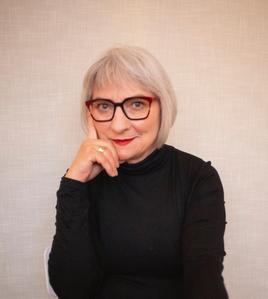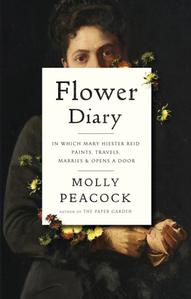
|
|
| photo: Candice Ferreira | |
Molly Peacock is a biographer and poet. Her first biography, The Paper Garden: Mrs. Delany Begins Her Life's Work at 72, was named a Book of the Year by Booklist, the Economist, the Globe and Mail, the Irish Times, the London Evening Standard, Maclean's and the Sunday Telegraph. She has also published seven books of poetry, including The Analyst. She is a co-founder of the Poetry in Motion series on New York City subways and buses. Her new biography, Flower Diary: In Which Mary Hiester Reid Paints, Travels, Marries & Opens a Door (ECW Press, September 14, 2021), follows the life and career of the 19th-century painter.
On your nightstand now:
You Must Change Your Life: The Story of Rainer Maria Rilke and Auguste Rodin by Rachel Corbett. Her takes on creativity--and the subsidiary lives of the creative women in orbit around creative men--are kaleidoscopic and illuminating.
The Nakano Thrift Shop by Hiromi Kawakami. Here's how a setting--a shop full of bric-a-brac--can bring together disparate characters of disparate ages and, through their personal quirks, make a love story.
Radiant Night by Patrick Lohier. Thrillers aren't usually my genre, but I love Lohier's portrait of a traumatized Iraq War vet and his encounter with the mysterious Mrs. S, who is looking for an heirloom tarot pack. The audiobook is on my virtual nightstand.
The Yellow House by Sarah Broom. I'm obsessed with home and house and space, and here is the disheveled house that becomes a character in Sarah Broome's memoir of her family and New Orleans.
Forgotten Work by Jason Guriel. Here's a verse-novel that is a sustained, dazzlingly crafted, adventure into the 21st century.
Favorite book when you were a child:
Mr. Bear Squash-You-All-Flat by Morrell Gipson, illustrated by Angela, in which a bear gets his comeuppance by a mouse, a chipmunk and a baby rabbit who all keep house in an abandoned truck tire.
Your top five authors:
As both poet and a prose writer, I'm dividing my top five into two genres. First up, poetry: Poems, the collected works of Elizabeth Bishop, for their clarity and descriptive wonder.
And I can't live without the 17th-century metaphysical poet George Herbert. He's a mix of the sacred and the sexual, always candid about his.
Nancy Milford changed the art of biography with Zelda, but my favorite is Savage Beauty, her biography of poet Edna St. Vincent Millay.
Barbara Pym I adore for the glimpses into post World War II Britain, for gimlet-eyed observation, humor--and for valuing the life choice of living alone.
My ultimate choice? Murasaki Shikibu's The Tale of Genji. Here's a piece of 11th-century Japan by a magnificent woman writer tracking the amorous adventures of Genji and the intrigues of the court.
Book you've faked reading:
Moby-Dick by Herman Melville. How on earth could my public school fifth-grade teacher have assigned this as "Extra Credit"????? An option I chose, because what good girl didn't need to stockpile Extra Credit for a rainy forgot-her-homework day? In tears I sobbed at the whaling, until my mother picked it up and pointed to passages as if she were opening a Bible. Landing her index finger on a passage, she compiled a list of quotes, and I wrote a 10-year-old's assessment of each one. I have never been able to approach it since.
 Book you're an evangelist for:
Book you're an evangelist for:
Denton Welch's memoirs Maiden Voyage and A Voice Through a Cloud. Welch, a detailed, emotional observer, is infatuated with life, writing his memoirs after a bicycle accident derails his career as a visual artist, leaving him often in bed, and sometimes in such terrible pain that he can only write a sentence at a time. In Maiden Voyage he dazzles as a depicter of childhood--remember being the perfect height to reach your tongue out to a door knob?--and he conjures up sumptuously precise details as he tracks his coming of age as a gay boy in England in the 1930s. Welch died at 31.
Books you've bought for the cover:
The Door by Magda Szabó. I loved the spare Eva Hesse drawing on the cover and discovered a triumph of a novel. The Brontë Cabinet: Three Lives in Nine Objects by Deborah Lutz. I bought this unusual, enrapturing biography because of the Victorian necklace on the cover.
Book you hid from your parents:
I did not hide books from my parents. My mother felt I should read anything at all that I wanted to. And my father didn't really notice.
Book that changed your life:
The Poetics of Space by Gaston Bachelard. The mid-20th century French phenomenologist said all the things about space and poetry that I felt and believed but never articulated. I did not grow up in a French villa--far from it. I grew up in a little house in Buffalo where my alcoholic dad punched holes in the walls. But houses and space, dimension and boundaries, I understood intimately, and in the desire for that house of my dreams, and for the mental space that could form a mansion in the mind, and in the belief that poetry was that house, that hut, a shell, a nest, came the magic of this book, a talisman for all I write.
Favorite line from a book:
"Art 'copying from life' and life itself/ life and the meaning of it so impressed/ they've turned into each other. Which is which?" by Elisabeth Bishop in "Poem."
Five books you'll never part with:
The Necessary Fiction: Life with James Joyce's Ulysses by Michael Groden. He's my late husband, and this is his scholar's memoir attempting to answer the question: How can one man spend a whole life with one book? I'm moved again and again by his choices and his lifelong commitment to James Joyce's Ulysses.
The Penguin Book of the Sonnet, edited and with an introduction by Phillis Levin. I'm holding on to this forever. The introduction alone can keep a poet like me going for a lifetime. If you want to see the Western world through a single lens, the sonnet, then start here with Shakespeare and barrel through the centuries, watching the progress of fireworks that inspire sonnets today by the likes of Tyehimba Jess.
A Dictionary of Symbols by Juan Eduardo Cirlot. This is like a tarot pack, a perennial horoscope, an underground stream. It's a compendium of symbols from around the world, something to be lost in, full of associations and depth, from a remarkable Spanish poet, art critic, and symbologist.
Home Cooking by Laurie Colwin. Here's the compendium of food columns that novelist Colwin, specialist in domestic happiness, wrote for Gourmet magazine. It's surprisingly contemporary, full of the stories of her cooking for others, especially her failures in the kitchen and the moving recipes of dishes Colwin cooked for homeless women. I particularly adore the audiobook narrated by the straightforward, easy-going voice of Gayle Hendrix.
Playing and Reality by D.W. Winnicott. For me, this is THE book about the psychological sources of creativity for me. Winnicott's idea of how play is a holding area--like poetry--inspires and moves me. I live his theories in my writer's life every hour.
Book you most want to read again for the first time:
War and Peace. I came late to Leo Tolstoy, and one luxurious summer listened to the audiobook read by the amazing Neville Jason. I would adore it if I could be carried back to that summer when my husband was alive and healthy, and I had just started thinking about writing Flower Diary, and the voice of Neville Jason was creating a different tone for every single character in the panoramic novel with his equally panoramic voice. (There's a new War and Peace audiobook narrated by the incomparable Edoardo Ballerini, too.)

